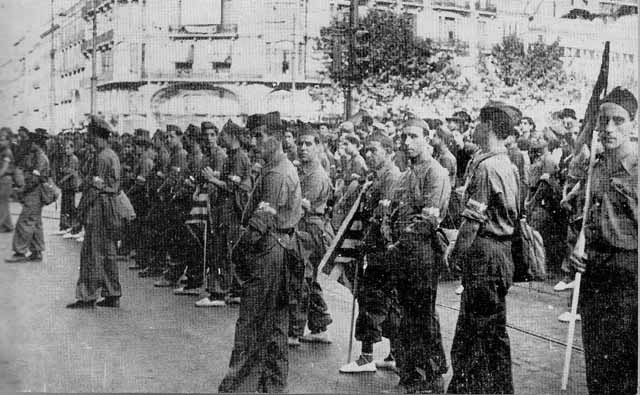[History] The Spanish Earth
 •
by
•
by ErnestHemingway

We all play eRepublik and think ourselves as great military commanders, soldiers and tacticians. We shine in the political negotiations across the world. We rewrite history...but what do we know about our own history?
This is the first article on (military) history and the great conflicts of the real world. Now and then, I will try to bring chapters of history to live through photos, sound and video.
We start in Spain, 1931.
The Spanish King Alfonso XIII found himself abdicated by the Spanish people. There was little to none support for monarchy left in the Spanish cities and the Second Spanish Republic was democratically elected by the Spanish people. (the First Spanish Republic had been overthrown by dictatorship a few decades earlier.)
The Second Republic prevailed despite opposing forces, such as the church and the army. Unsuccesful military coups were fended off and key military figures, such as General Franco (yes, that guy) were send to outposts and sacked from important posts.
In 1936, another military coup started in Morocco (which was Spanish territory) and opposed Nationalists against the Republicans. At first, the rebellion wasn't all that succesful and only Seville fell into the hands of the Nationalists. There was no hope for a swift coup d'état anymore.

Republican volunteers rallying to defend Madrid.
The Nationalists depicted their struggle as a combat between Christians against Communists, while the Republican propaganda showed the battle between tyranny and democracy.
Europe was watching and many factions and countries decided to intervene on behalf of 'their side'. Fascist Italy, Portugal and Germany backed up the Nationalists against the 'Red Threat', while the Soviet Union, Mexico and the International Brigades (unions, students, socialist parties, ... all over Europe sent soldiers) supported the Republicans.
The Spanish Civil War raged on until 1939, when Franco's troops, bolstered by Italian and German tanks, finally secured the victory for the Nationalists. Franco would stay the leader of Spain until 1973.

British poster for the International Brigades.
The US chose not to intervene, but even across the Atlantic, opinions were divided and a strong (German) lobby kept Hollywood from giving the conflict much attention. In 1937 however, a group of literary figures, such as Ernest Hemingway, decided to back a Dutch documentary maker, Joris Ivens, to make a propaganda film for the Republicans.
This film was written by John Dos Passos and Ernest Hemingway and narrated by Ernest Hemingway. It mixes scenes from rural Spain with fragments from the actual war.
Even today, it is regarded as an unique document and great example of both propaganda and war journalism.
Intrigued? You can view the entire film, complete with the voice of Ernest Hemingway here.


Comments
your articles are always interesting... : )
since it has an international scope, feel free to shout it 🙂
I thought it was about the civil war between pro-TWO and no-TWO factions in current eSpain...
I'm not saying who's who 😉
у нас в России тоже была гражданская война в 1917 году
Oh, a conflict I will definately write about sooner or later!
если вы опишите гражданскую войну в Российской Империи 1917 года я буду вам очень признателен в Европе об этой братоубийственной войне известно очень мало ведь именно в результате победы в этой войне красных над белыми и возник Советский Союз
Interesting!
That civil-war was used pretty much just as a testing ground for their weapons and tactics. For example the Germans sent 88 mm AA guns and stukas to the war and they really proved their horrifying efficiency at killing.
It's not that it was a prelude to WWII, but it definately showed how anxious and stressed European countries already were. Also, the fact the US didn't want to annoy Germany at that time, was already a sign they would not easily step into a World War with Germany.
Mini bio-pic of his involvement there in the 2012 movie Hemingway & Gellhorn. ' really liked it.
It was a good film, especially since Hemingway and Gelgorn were both quite equal, if not Gelhorn a bit on top. It also depicted the political machinations of Europe and the Sovjet Union very well.